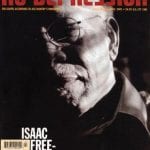Christy McWilson – The other side of midnight
In the end, for all its swagger and style and violent enthusiasms, rock ‘n’ roll is child’s play. Big loud fun, big dumb sex, nothing wrong with that, and long may you run. Sometimes…sometimes the music even sweeps another generation toward unexpected purpose, undreamt heights. Or depths, sometimes.
But there it evaporates, as does youth, and life reveals itself to be a far messier proposition. Time erodes the certain clarity of youth, erases, reshapes, until it is comforting simply to rise from bed and contemplate the morning coffee.
See, there it is: Morning. Rock ‘n’ roll is a midnight rambler, a costume ball, the unquestioned luxury of those who have nowhere to be at 7 a.m. The lucky ones, perhaps.
What, then, for the rest of our lives? Surely rock’s anthems of courtship and parties and slogans do not fit the years in which black and white turns gradually to gray.
And yet there is much to be found in those gray spaces: Hard, restless nights, longer days, the gathering gloom of mortality, the growing certainty of one’s limitations, and of one’s capacities. Nothing exciting in all that, but it is rich ground, and home in the long run. If you are lucky enough to grasp it, to shape carefully, there is also a generous harvest to be found, for real life is rarely so dull as television insists, and enduring art is hardly the province of precocious youth.
Sometimes it feels like this:
My life is a tightrope
Maybe you’re unaware
Maybe I’ve spelled it out so much
That you’re tired and you just don’t care.
Christy McWilson sings her words with a survivor’s joy. She is 45. An artist. A mother. A wife. She has counted the costs of her life, written them down, given them voice. And it’s a great voice. Well schooled in Northwest irony, she called her first solo album The Lucky One, and meant it. The new one is called Bed Of Roses, and she means that, too.
My wife will read this: It’s not that bad, darlin’. Honest. Not bad at all. Good, really. But at some point life does not reduce to a rock ‘n’ roll song, and something of more subtle shading is called for. Simple as that.
And Christy’s music, it’s easy to listen to, full of carefully rendered language. Hell, it rocks, even. Thing is, it counts for something. The words count for something, and they take courage to sing, to embrace. Easy to listen to, yes; a good bit harder once heard carefully, and not so easy to make, as it turns out.
“Yeah, I’m discontented,” she says, seated comfortably at home in West Seattle. “I think most people who hit my age get discontented. I think there’s a lot of disappointment, that’s part of middle age. It’s kind of going, OK, what do I have to look forward to? Kind of worrying about it a little bit.”
Music, mostly of the classical variety, was around her family’s Southern California household all along, but Christy went astray early. “Both my parents are musicians,” she says (her father is also a psychiatrist). “I was the first born and I think they thought that…I mean, they put me up on that piano bench when I was really young. I think I couldn’t even read. And I was kind of a disappointment. I had a gift for making up the ends of the songs because I couldn’t read the music. I got busted because I made up a whole ending, and it was quite a scandal at the time.”
Surely her high school dalliance with rock bands was just another example of the family genes gone awry. “I was the only person I knew that was doing that, that was female anyway,” she recalls. “I was either the girl with the tambourine or like Linda McCartney. That was a put-down.”
She was, of course, neither. Rather, McWilson was among the first generation of women to follow Emmylou Harris’s footsteps toward the spotlight. This is important. Thirty years ago things were different and women did not rock, certainly not women from good homes. Fifty-five years ago it was, apparently, acceptable for a professor at the University of California to tell my mother that she could hope for no better than a B in his class, for surely she didn’t expect to compete against men in the workplace. Not that long ago, any of it.




